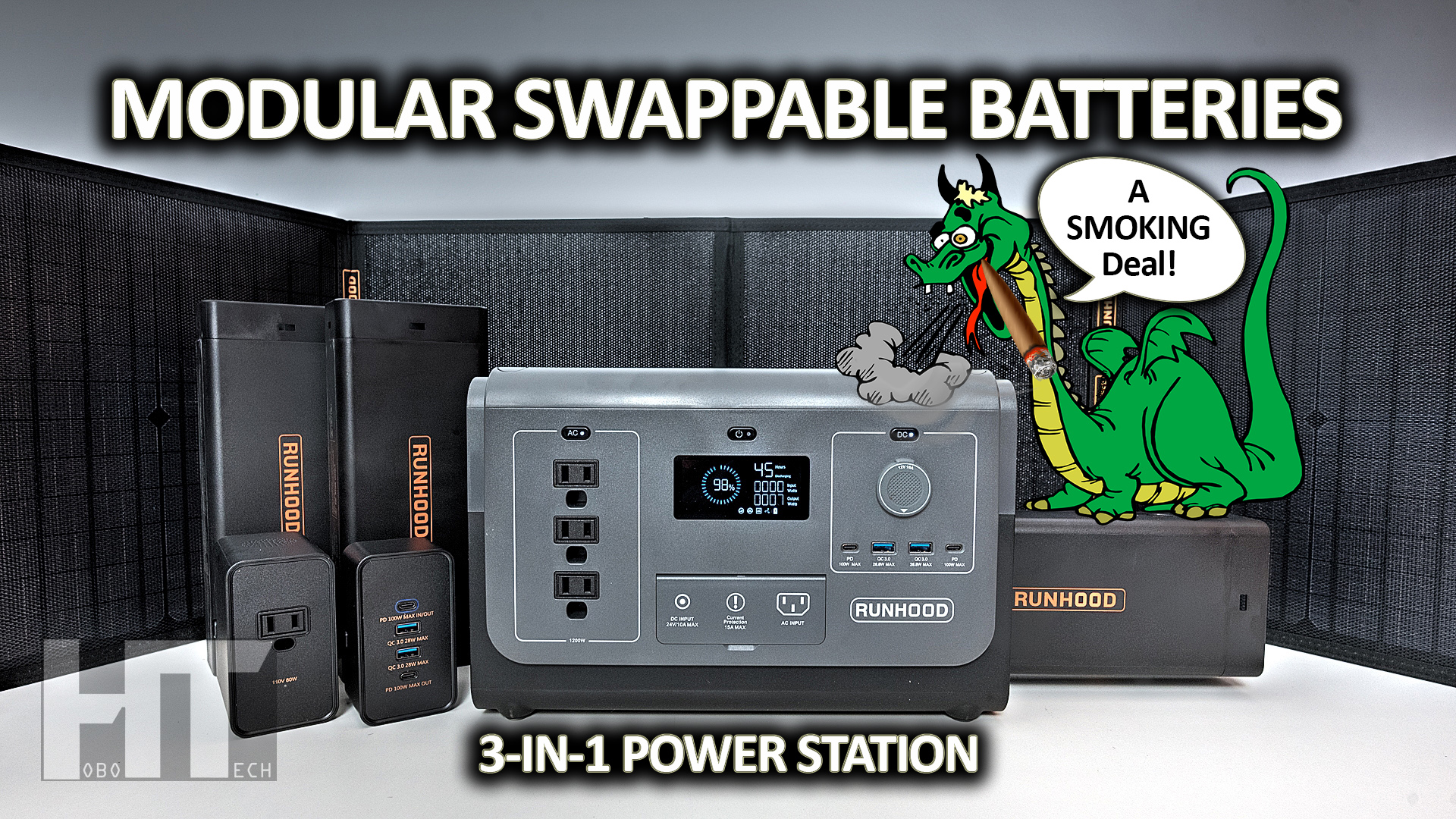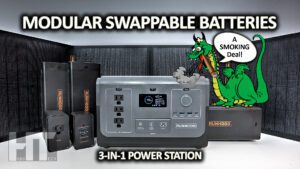
RUNHOOD Rallye 1200w Hot Swappable Modular Battery UPS Solar Generator
The Professor reviews the Runhood Power Rallye 1200 watt “Pro” modular solar generator with hot swappable batteries and 100w solar panel. Features a unique “snap on” inverter and power bank turning extra batteries into usable power stations!
Back in the spring of ’22 I reviewed a new innovative 600w power station called the Rally from new kid on the block, RUNHOOD Power. Most of the complaints at the time were that the product was just too small. Runhood has since expanded their product line to now include a new 1200w version they call the Rally 1200. So what’s the big deal? It’s one of the only midsize power stations on the market that doesn’t have batteries built in – instead the batteries slip into the side and are fully modular. But, is it any good? Let’s find out!
Features
-
Battery Capacity/Tech/Cycles: The Rally 1200 is a fully modular system so the “host engine” as they call it is the power station part without any batteries. It has two battery receptacles where you can use either one or two batteries (or what they call power bars) simultaneously. Each one of these power bars are 324wh each so essentially the size is up to 648wh. However, since the Pro package comes with 4 of these batteries it’s technically 1296wh. Actually, it’s as big as you want it to be because as long as you have enough batteries and a way to recharge them before the last one runs out you have virtually unlimited power since they are hot swappable – meaning you can swap the batteries while using the power station. That’s pretty cool. Now in order to keep the size and weight down these batteries are NMC technology with a 1000 cycle life expectancy and not LiFePO4, but since they are swappable if you do manage to kill a battery just swap in another one.
-
Size/Weight: approximately 13x8x8 at 10.2 lbs
-
Design/Display: The product is all ABS plastic with a folding handle and a color LCD screen that appears to be from the same parts bin of another major brand.
-
Inverter Size/Type (constant/peak) and #outlets: It sports a 1200w pure sine inverter with a 2400w peak from 3x 15A outlets
-
Ways To Charge (and times for each): Assuming a 648wh battery configuration, it can be charged at 400w from AC power using the direct power cable in about 2 hours, 180w from the AC power brick in about 4 hours, from 200w of solar in about 4 hours, or 120w from 12v DC in about 6 hours.
-
12v Output Types: It offers a single 12v cigarette lighter style socket that can handle 10A and is regulated at 13.3v
-
USB Output Types: The 1200 has a pair of 100W USB-C PD outputs and a pair of 28w USB-A quick charge ports. So unlike everyone else that’s skimping lately on the quick charge ports, Runhood is not.
-
Other Outputs: The Runhood does offer a 15w fast wireless charging pad up top and a fancy flashlight on the side with a compass in the stock. Sorry, I just watched A Christmas Story this evening…
-
Other Features: If you opt for the Pro package it also comes with a neat 80w snap on inverter and a power bank snap on adapter that fits directly to the energy bar batteries so you can use them to power other stuff when the power station is in use elsewhere. I’ll demo these in a bit.
-
Warranty: Runhood offers a 3 year warranty when you register your product online.
Testing
-
DC Battery Capacity Test (time lapse): 532wh/648 for a respectable 82%. However when we ran the
-
AC Battery Capacity Test (time lapse): the results were an unacceptable 400wh/648 for only 62%. At first I thought my results were in error so I ran the test a 2nd time with a different set of batteries and got similar poor results which was explained after I did the the next test.
-
Phantom load / Parasitic drain test
-
DC consumption: used 21wh (%) over 12 hours or about 42wh over 24 hours
-
AC consumption: used 121wh (%) over 4 hours or about 726wh over 24 hours. If you left the inverter on it would totally kill the battery in about 21 hours. Ouch. Doing the math this little 1200w inverter is burning 30w just to be turned on. Since the AC battery capacity test runs for about 4 hours that explains the missing 120wh from that test.
-
-
Sine wave check under load: 120/60 clean
-
Inverter capacity test (max): 1250w <1s
-
Cooling ability test (rated @ 5mins): 1200w 10m
-
Inverter fan noise db: 57
-
Max Charge Rate @ watts/volts: AC fast 400w ; quiet w
-
DC rate: 120w @12v ; 200w @24v; >30v = meltdown
-
Charging fan noise db: AC max db ; AC min db ; Solar db
-
Simultaneous charging ability: DC blew up
-
Pass thru / UPS: pass
-
DC Output(s) Max Rate: 10A 12.7v
-
12v output(s) regulated: 13.3v
-
USB output rate check: 2x100w pass
-
Wireless/other output: fast 12w
-
Amp interference test: pass
-
AM radio test: very noisy
-
EMF test: 80 (very high)
-
- Light demo: done
-
APP/solar test: no app
-
notes: batteries overheat over 1C loads; MPPT smoked over 40v; 180w brick also DOA
My Opinion
-
Okay, lets get the cons out of the way first. Yes, I blew it up in my testing which was entirely my fault. In the real world with a proper 200w solar panel this would never happen, but this is HOBOTECH and I find the limits on my product so you don’t have to on yours. Yes, Runhood should absolutely add upper voltage protection for the MPPT controller like everyone else has and frankly I’m shocked we’re almost in 2024 and I can still blow up any MPPT controller with only 40 volts. Obviously an oversight on their part, but again something that probably won’t happen in real life if you only use their solar panels or at least limit input to 200w 12v panels that run a maximum of 27v open circuit. You also have the included 3 year warranty just in case something does go wrong.
-
Second, the overheating issue can certainly be a pain in the butt. They keep these power bar batteries isolated inside the host engine without any apparent active cooling. Under any serious loads for any real length of time they over heat. While it seems in most cases you can still use the inverter as usual, you just can’t recharge them by AC or Solar until they cool off which can take 15-30 minutes or more. This is only going to be an issue if you’re pushing the inverter into the upper limits around 1200w where the batteries are being discharged at 2C rates (1C equals the rate at which a battery can be fully discharged in one hour). I haven’t seen any overheating when simply charging the batteries since the chargers run at a much lower rate.
-
Finally, the AC parasitic drain test results were brutal. This is not a device you want to use to power AC loads for long periods of time unless you plan to do some battery swapping.
-
As for the good stuff, the Runhood is that very unique product on the market that no one else really has. It’s a midrange size fully modular power station that can basically run indefinitely as long as you have enough power bars and solar panels to keep it going. The batteries are hot swappable so when one is about to die just slap in another one. Since the power station can run on a single power bar battery, you can technically charge the other 3 with solar or AC power via the included adapter in the interim in a totally separate location.
-
Probably the neatest feature is the snap on power bank and inverter module that turns your extra power bar batteries into mini power stations of their own. The power bank one I find the most useful because it lets you charge the power bar batteries with 100w USB PD when you’re away from the main power station. Having a pair of 100w PD ports on such a big battery would be great for running a couple of high end laptops when on the road or during a blackout.
-
That takes us to the next best thing about this Runhood power station … the price.
Pricing and Competition
-
Product Price with current discount:
-
The Rally 1200 PRO which is a 1200w product with a bundle of 4 “power bar batteries” totaling 1296wh, a 100w solar panel, and the mini inverter / power bank modules retails for $1599, but being HOBOTECH I was able to Priceline negotiate a $500 off discount code bringing this bundle down to only $1099. That’s 84 cents per watt hour but remember this is a fully modular system and that price includes a solar panel and the two power bar module add ons.
-
Note there are also two other lower priced bundles if you’re interested. If you want to bypass some of the extra bling, there is the Rally 1200 Plus which is the 1200w power station with 4 power bars totaling 1296wh. Price with discount code is only $842 or just 65 cents per watt hour. If you don’t need the solar panel or the mini inverter / power bank modules this is your best deal.
-
The last bundle is just the 1200w power station and a pair of power bars totaling 648wh. The price with discount code is $599 or a brisk 92 cents per watt hour. So you see the best bang for the buck ends up being that midrange “Plus” bundle for $842.
-
-
Market Focus:
-
This is a midrange power station so it can handle some smaller appliances but none of the real big stuff. While you should be able to start up and run a standard energy star residential refrigerator on a 1200w inverter, some of the larger models may not start. It will definitely handle apartment sized or dorm fridges along with 12v fridges. It’s not going to handle your Keurig, huge 12 cup coffee pot, or your large microwave, but it can handle smaller drip machines and dorm/RV size microwaves under 700w. It can obviously handle low draw appliances like laptops, tvs, fans, PC’s and the like. I think you get the picture.
-
-
Recommended Solar Panel Type/Size:
-
I strongly recommend sticking with either Runhood solar panels in a maximum 200w configuration or use your own 3rd party panel if it is 200w or less. It must be a 12v-18v solar panel, not a 24v or residential panel. Anything over 200w and you see what happens. Use 3rd party panels at your own risk.
-
-
CHECK OUT RUNHOOD HERE: https://gohobo.io/rallye use code OFFFORPRO for “Pro” version [ use code OFFFORPLUS for “Plus” version and OFFFOR1200 for base “1200” model ]


You must be logged in to post a comment.